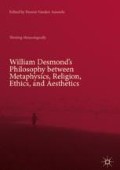Abstract
D.C. Schindler reminds us that the motto of Villanova consists of three terms: Unitas, Caritas and Veritas. Postmodern philosophy is keen to malign good Veritas as an exercise in oppression, something which must be avoided if we truly want to reach universal care and unity. In opposition to this trend, Schindler illustrates how Desmond’s philosophy is capable of giving truth its dues against the assaults of Vattimo and others, but also and more importantly that truth serves as foundational for unity and care. Building from Desmond’s Intimate Universal, Schindler illustrates how care and unity need an ontological grounding in truth in order to be more than merely superficial.
Access this chapter
Tax calculation will be finalised at checkout
Purchases are for personal use only
Notes
- 1.
To be sure, Vattimo constantly cautions us not to allow the liberating ‘death of God’ to harden into a new ‘truth’ we can use to inflict violence on our enemies. Respect for everyone, according to him, requires, not a foundation, but a commitment to avoid violence. Much more would need to be said, here, to show the impotence of this commitment without a foundation (for a sustained discussion of this problem, see Schindler 2008, Chapter 1), but our concern here is not Vattimo himself, but the more general cultural drift he brings to expression.
- 2.
It is important to note that Desmond does not posit eros and agape as two separate kinds of love, but rather as different dimensions of one love, dimensions that always tend to share in themselves aspects of the other. In a similar way, the inwardness of the idiotic and the outward, expressiveness of the aesthetic are by no means opposed to each other.
- 3.
Aquinas, 1932, 3.7: “Ipsum enim esse est communissimus effectus primus et intimior omnibus aliis effectibus”.
- 4.
Gilson (1999). Through a survey of monumental thinkers in the medieval and modern eras, Gilson shows the implications of the forgetting of the philosophy of being and its replacement by something else (e.g., theology or logic). Desmond engages more profoundly with late modern and postmodern thinkers, and explores the implications in concrete cultural realms such as the family, the experience of art, the shape of politics and so forth.
- 5.
The term ‘metaphysics’ has returned in contemporary philosophy, in particular, in the schools of ‘speculative realism’, ‘object-oriented philosophy’ and the like, but these movements are quite different from the traditional (and basically human-centered) sense of metaphysics as the study of being qua being.
- 6.
See ‘Is there Metaphysics After Critique?’, and ‘Metaxological Metaphysics and the Equivocity of the Everyday’, in ISB 89–119 and 155–184. Of course, this simply recovers the traditional sense. It is only in the modern period that metaphysics comes to mean ‘beyond’ in a straightforwardly dualistic way.
- 7.
This is not meant to imply a simple correlation between truth and universality, on the one hand, and love and the particular, on the other. Truth is of course also a matter of the particular, and love of course also has an essentially universal dimension.
- 8.
We might consider, in this regard, Vattimo’s somewhat notorious support for the violence of Hamas.
- 9.
For a fuller development of this particular sense of poverty in philosophy, see the essay entitled “Religion and the Poverty of Philosophy” in IST 105–133.
- 10.
See ‘The Confidence of Thought’ in ISB 202–230.
- 11.
Hence, the connection he draws between his version of hermeneutics, as opening up an infinity of interpretations, and (modern) democracy: see Chapter 8 of Vattimo (2004, pp. 90–101).
- 12.
‘Ways of Wondering: Beyond the Barbarism of Reflection’ in ISB 260–300, here: 266.
- 13.
- 14.
IU 135. Claudel develops his notion of ‘co-naissance’, ‘being born with’, in Claudel (1957, p. 1060 ff).
- 15.
Augustine (2017, 12.17). I am grateful to Michael Camacho for pointing this passage out to me; the translation is Michael’s. I would also like more generally to acknowledge helpful suggestions by Dennis Vanden Auweele in preparing this chapter.
Bibliography
Aquinas, Thomas. 1932. Quaestiones disputatae De potentia dei. Trans. English Dominicans. Westminster, MD: The Newman Press.
Augustine. 2017. De catechizandis rudibus. Unpublished Trans. Michael Camacho.
Claudel, Paul. 1957. L’art poétique. In Oeuvre Poétique. Paris: Gallimard.
Gilson, Etienne. 1999. The Unity of Philosophical Experience: The Medieval Experiment, the Cartesian Experiment, the Modern Experiment. San Francisco: Ignatius Press.
Schindler, D.C. 2008. Plato’s Critique of Impure Reason: On Goodness and Truth in the Republic. Washington, DC: CUA Press.
Spaemann, Robert. 2015. The Robert Spaemann Reader. Oxford: Oxford University Press.
Vattimo, Gianni. 2004. Nihilism and Emancipation: Ethics, Politics, and Law. New York: Columbia University Press.
———. 2007. After Christianity. New York: Columbia University Press.
Author information
Authors and Affiliations
Editor information
Editors and Affiliations
Rights and permissions
Copyright information
© 2018 The Author(s)
About this chapter
Cite this chapter
Schindler, D.C. (2018). True Being and Being True: Metaxology and the Retrieval of Metaphysics. In: Vanden Auweele, D. (eds) William Desmond’s Philosophy between Metaphysics, Religion, Ethics, and Aesthetics. Palgrave Macmillan, Cham. https://doi.org/10.1007/978-3-319-98992-1_3
Download citation
DOI: https://doi.org/10.1007/978-3-319-98992-1_3
Published:
Publisher Name: Palgrave Macmillan, Cham
Print ISBN: 978-3-319-98991-4
Online ISBN: 978-3-319-98992-1
eBook Packages: Religion and PhilosophyPhilosophy and Religion (R0)

